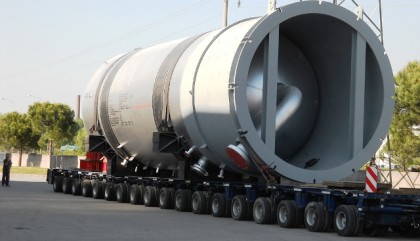EU standard in the project and heavy cargo transport
05/02/2016 - 18:05:00
The firms conducting the project and heavy cargo shipments in Turkey have long been waiting for the enactment of a legislation regarding special cargo transport.
 The draft of the “Regulations on the Transport of Heavy and Balloon Cargo” drawn up through the cooperation between UND, Kadir Has University, and Crane Operators Association and presented to the Ministry includes the applications arranged in line with the EU legislation in the transport of the heavy and balloon cargo and brings about innovations that will fulfill the requirements of the sector.
The draft of the “Regulations on the Transport of Heavy and Balloon Cargo” drawn up through the cooperation between UND, Kadir Has University, and Crane Operators Association and presented to the Ministry includes the applications arranged in line with the EU legislation in the transport of the heavy and balloon cargo and brings about innovations that will fulfill the requirements of the sector.
The energy and construction investments that increased both domestically and regionally during the recent years have improved the heavy cargo and out-of-gauge shipments conducted through Turkey. However, the lack of legislation and the problems resulting from implementations prevent the project and heavy cargo transport from development and depontentiate the competitive power of the Turkish logistics firms. The representatives of the sector are waiting for the creation of the legislation for the special cargo transport as soon as possible. Stepping into an action for this purpose, International freight Forwarders Association (UND) first created the Special Cargo Working Group in November 2011. UND Special Cargo Working Group that started to scrutinize the legislations and implementations in both Turkey and the EU by holding regular meetings and to conduct communications with the respective public institutions within the scope of the problems encountered prepared the draft of the “Regulation on the Transport of Heavy and Balloon Cargo Transport” drawn up through the cooperation between Kadir Has University and Crane Operators Association. The draft of the regulations prepared painstakingly through a long running study includes the implementations arranged in line with the EU legislations in the transport of heavy and balloon cargoes and brings about innovations that will fulfill the requirements of the sector.
GENERAL METHODS AND PRINCIPLES DETERMINED THROUGH THE REGULATIONS
The draft regulations presented to the Ministry of Transportation, Maritime Affairs, and Communication consist of four sections entitled “General Provisions,” “Specific Rules for the Transport Activities, Vehicle Types and their Properties, Special Permits, Escort Vehicles,” “Inspection, Fines, Sanctions,” “Authorizations, Safety Consultant, Training, Institutions Responsible for Implementation, Various and Final Provisions.” The objective of the draft regulations is summarized as follows:
“The general methods and principles regarding the arrangement of the activities relating to project logistics, heavy cargo transportation, and mobile crane operations in line with the requirements of the country economy; ensuring the order, safety, and security in the transport activities in question; identification of the rights, obligations, and responsibilities of the performers of the project logistics, heavy cargo transportation, and mobile crane operations and of the participants of the same within a structure that is sustainable and that is defined in a particular framework; determination of the cargoes carried with the vehicles, equipment, and installations used in the shipments in question and classification of them within the framework of their specifications; determination of the precautions that need to be taken for the realization of the shipments through the maximum possible efficiency, effectiveness, speed, and benefits; identification of the requirements for enabling the competition at international levels; and providing the inspection, control, and tracing processes that will be applied in line with the above-mentioned objectives with a more efficient structure.”
SPECIAL WARRANTS MEET STANDARDS
Most outstanding problem in terms of project and heavy cargo shipments is the issue of requesting a warrant and escort vehicle, including the unloaded movement of the vehicles with the out-of-gauge sizes. The fact that a vehicle with the out-of-gauge standards is to receive separate warrants for each movement, including its movement and round trips for the situations like repairs and receipts of certificates other than the transport of cargoes, brings together heavy costs for the firms conducting the transport of heavy cargoes within the sector. Lack of any definition regarding the escort vehicles that accompany the vehicles carrying special cargoes constitutes another problem experienced. Significant clauses relating to the solution of this problem are available in the draft regulation.
In line with the researches conducted in the EU regarding the Special Warrants and the texts included in the draft regulation also within the scope of the EU norms, the Special Warrants that must be taken from the Highways Directorate General for each transport will meet new standards. According to the manner of transport and the respective applications for the warrants, the Special Warrants that range from the minimum 15-day documents to 3-year long-term documents, as in the EU countries, are within the draft regulations. The regulations bring new standards for the escort vehicles and specify the details about the situations and types of vehicles on which escort vehicles will apply in line with the EU norms and practices.
MOTORWAYS TO BE USED IN SHIPMENTS
In the transports of special cargoes, the fact that the use of the TEM is not permitted and that only the E-5 route can be used brings together some setbacks. Entrance of the vehicles carrying out-of-gauge cargoes into the traffic, which is already restricted, in the provinces through the use of the E-5, poses significant dangers for both transportation services and other vehicles, even for pedestrians as well. The studies in the EU and the EU norms show that the highways are used instead of the urban roads. One of the demands to be submitted to the Ministry of Transportation, Maritime Affairs, and Communication together with the draft regulations will be the issue of the use of the highways for such transports as in the EU.
Problems are also encountered in the crossings over the bridges during the transport of special cargoes. 54-ton’ limitation constitutes another issue that prevents the transport of special cargoes. The issue relating to the bridges has been furnished to the Ministry of Transportation, Maritime Affairs, and Communication. The issue of the realization of the appropriate transports over the 3rd Bridge route upon the completion of the construction of it and relaxation of the tonnage restrictions for the benefit of the sector in line with the new vehicle restrictions is one of the demands.
SHIPMENTS TO BE CONDUCTED IN THE SUITABLE TIMES OF A DAY AS WELL
Another problem encountered in the special cargo transports is that no transport can be carried out during the night hours and such transports are allowed to take place only from dawn to dusk. Within the scope of the studies conducted in the EU as well as the EU norms, it appears that the transport operations are conducted only during the nighttimes and appropriate times of the day. Objective has been set to remove this problem and to make it possible to conduct the transports during the hours of the day when the traffic is the lowest and nighttimes through the “Provisions regarding Driving Times and Restrictions” included in the draft regulations within the scope of the best practices carried out in this regard. Following evaluations are present in Clause 24 included in the regulations relating to the issue:
1- Utilization of the mobile cranes and the vehicles used in the transport of heavy and balloon cargoes is forbidden in particular hours and holidays within the scope of the limitations regarding the dimensions and measures specified in Annex-5.
2- Although it differs in the motorways, divided roads, and provinces, occurrence of the vehicles with the measures above those specified in the Annex in question, such as width and length, within the traffic, is forbidden in the periods between the hours of 10:00 a.m. to 04:00 p.m. and 10:00 p.m. to 06:00 a.m.
CARGOES WILL NOT BE LOST TO THE COMPETITORS
In the new project and heavy cargo shipments, in the transport of high tonnage (150-ton and above) loads, a toll is paid for the control of the conditions of the bridges and viaducts on the route by the engineer firms. Increase of such tolls up to the figures varying between 80-thousand TL to 110-thousand TL places a substantial burden on the sector. Collection of the fees in question from the shippers separately for each shipment causes the out-of-gauge shipments to be directed to the ports of Basra and Aqaba where lesser costs and procedures are present. This reduces the transit potential of cargoes through Turkey.
In the meetings of the sector representatives with the Ministry of Transportation, Maritime Affairs and Communication, the issue that the inventory of the bridges and viaducts situated on the routes that will be used by the carriers nationwide will be prepared and renewed in particular intervals by the state has been discussed. For example, in the studies conducted in the EU countries, it appears that such reports are prepared by the state and no financial burden is reflected to the forwarders. The demand of the sector for this issue is that such reports are made by the state as in the EU and an item of cost for the sector will be removed accordingly.
TRAININGS TO BE STANDARDIZED TOO
Thanks to the draft regulations, the trainings regarding the sector and shipments will be subject to a particular standard. The provisions that allow the drivers tasked in the project logistics, heavy and balloon cargo transportation and mobile crane operations to conduct the transport operations in a more educated and conscious manner and that contain the obligations of the forwarding firms relating to the shipments are included in the draft regulations.
PROBLEMS ENCOUNTERED IN SHIPMENTS
• Failure to provide the special cargo warrant documentation for a long term
• Night driving restrictions
• Difficulty to use the E-5 Highway
• The issue of crossing over bridges
• Speed restrictions
• Problems encountered in standards for the escort vehicles
• Fees paid to the engineering firms
• Differences between the EU legislation and the Turkish legislation and the problems they pose
• Request of the original consent documents in the roadside inspections and weighbridge areas























































